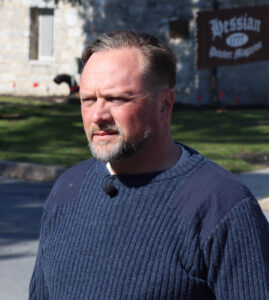
Friday, October 11 at 12:15 PM
Training the Next Generation of Preservationists by Processing Colonial Artifact Collections
Archaeological excavations at colonial fortifications like Fort Halifax and Fort Shirley tend to produce a rich array of material culture, providing diagnostic details that enrich our understanding of the French and Indian War in Pennsylvania. For historical archaeologists, documentation of military campaigns and commerce provides the historic threads upon which tapestries of archaeological interpretation of material culture may be affixed. Studying the artifacts like buttons, buckles, and lead ammunition from these sites provides a glimpse of the roots of globalization and the distribution of European material goods into the North American colonial frontier. They are forensic evidence of battlefields that often fall prey to looting activity. Many of the collections derived from Juniata College archaeological field schools are destined to be curated in The State Museum of Pennsylvania; but not before college students receive valuable training while fostering the collections through collection processing. Before artifacts find their way to the museum, some new (and some not so new) technologies are used in archaeological laboratories like the one at Juniata College’s Cultural Resource Institute. Standardized databases are invaluable for keeping track of literally thousands of artifacts facilitating comparative analyses across sites. Other technologies like 3-D scanning and printing of artifacts are used as a means of education and preservation. For every hour spent in the field, archaeologists work an additional four hours in the laboratory—identifying, classifying, and preserving the finds. Providing training, while involving undergraduate students in the process, helps them become better stewards of the past and even sets some on a career pathway in historic preservation.
Specializing in conflict archaeology, Jonathan Burns has been with Juniata College for fourteen years, teaching anthropology courses and conducting archaeological field schools in Pennsylvania. He is the Director of the Cultural Resource Institute (CRI), a research platform for historic preservation projects and student training. In this capacity, he oversees artifact processing and curation in the CRI laboratory on campus. Since 2017, Jonathan has headed the Veterans Archaeology Program—a grassroots initiative that offers continuing education to U.S. military veterans.
Presentations begin at 12:15 PM and last approximately 20 minutes followed by a question-and-answer session. Registration is required to attend these free, virtual programs. Click here to register now.
